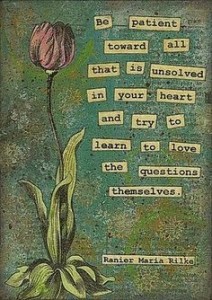5am Monday morning. One month ’til Christmas and three weeks to moving house.
All this measurement for planning seems inane, arbitrary; part of some busy work we do to fill the spaces where growing, tending and making used to be. For somewhere we remember that even aristocracy was once classless, digging in the dirt for yams or some such thing. Nobody was truly separate in the beginning.
Except there was no beginning. No first man; no first tribe. In non-duality we are all continuations of something in yet another form, and these labels used to draw lines between species, and borders between nations… these arbitrary cultural definitions that tell us we can put that group in a bubble of meanings, and this group in another. It’s all made up. And if that’s true, if the world is a fabricated collection of labels, then how do I know who I am?
 I Am…
I Am…
In this moment I am more than the possible ways you can define me. When the so-called “thought” arises – what is really going on? When the so-called “body” senses – who is having the experience? And where does consciousness come from if we are all Brahman?
These are the questions movies are made of. The Matrix to some is just another example of the Heroes Journey; that archetypal narrative modern culture tells us we all live by – get pushed, grow, become something you never thought possible, and in this process of “becoming,” learn to see the world differently, to see the world as an adult; as a wiser more powerful being that takes responsibility for less wise and less powerful beings – but this is not that story.
This is another version of what’s going on. A version that does not ask us to be more, or less. A version that allows us to be equal and essential aspects of nityaptasvarupa. A version in which we can trust ourselves to be who we are, and not have to become trustworthy by clearing, healing or fixing anything.
Hang On, What About The Matrix?
Although the Matrix does not go so far as to tell the story of being simultaneously Atman (self) and Brahman (all that is), it does question whose experience is being had when life is an algorithm rather than an objective duality of matter and force. Which is exciting because if we can look at film, open to the possibility that there is more than one version of the story, perhaps we can examine our own lives curious enough to experience this moment as both Atman and Brahman.
Ask yourself: “What would the world feel-look like if I truly stood in the place where all my labels about what is going on, were founded upon a trust that I am simultaneously Atman and Brahman?”
Would you need to make anyone right, wrong or incomplete? Would you need heroes or teachers? Would you see everything as an equal and essential aspect of Brahman?
Such a revelation would not simply require new labels for what’s going on, it would also require a new physics! Think about it! Our concepts of cause-and-effect would no longer apply on the same terms. Our explanations for “why” and “how” would change. Even our sense of universal harmony would no longer be the purview of Atman separate from Brahman, trying to re-balance the untenable whole. Instead, all action and judgment would be informed by svAtmasvarUpatva – one’s own true nature – simultaneously Atman and Brahman.
Perhaps the most revolutionary part of all this re-storying would be that we would have a means of allowing others to live their own truth, and experience their sense of what is going on (because we would see this too as Brahman).
 Choosing A Lived Experience of Non-Duality Naturally Re-Stories Our Reality
Choosing A Lived Experience of Non-Duality Naturally Re-Stories Our Reality
With eyes open to multiple, co-existing truths, our story takes on new meaning. Instead of seeing life from a fixed point in black and white; instead of believing ‘we’ can somehow be defined as separate, we seek to understand all things as open, curious, trusting explorers who wish to know for the sake of being present. A state of being present simultaneously to the knowable and unknowable world, where the Vedantic mokSha (the realisation of one’s non-dual nature as inherent) is no longer Apya (pursuable as an outcome) since svAtmasvarUpatva (one’s own true nature) exists inherently as all pervasive Brahman.
In such a state, instead of imposing truth upon a situation, awareness is open to the meaning of this moment as it reveals itself. And rather than judging this as a better way or even a smoother ride, we can abandon the consciousness of control in favour of trust in Brahman as nityaptasvarupa (having a nature in which everything is secured).

Hi Melanie,
This is a beautiful post, thank you, very thoughtful and well-written. I really enjoyed reading it. Plus “The Matrix” is one of my all-time favorite films anyway.
“There is no spoon.” 🙂
Cheers,
Charles
Thanks Charles!
I didn’t give myself a chance to comment on your post yet. It’s on my to-do list : ) I’m so glad we’re signed up together as newbies to the site (even though you are much more familiar with everything Advaita than I am).
Yes, “there is no spoon” is definitely one of my favourite catch phrases. There’s something so simple about the HOW of life that we find in remembering such things.
Love & Poetry,
Melanie